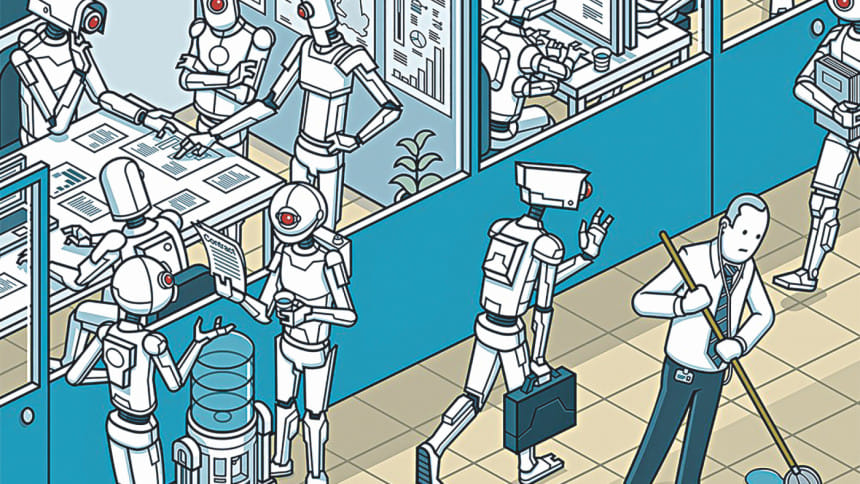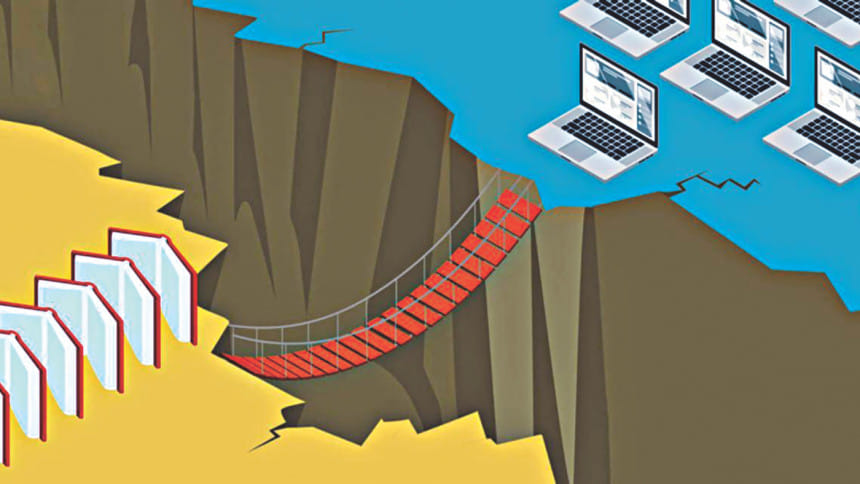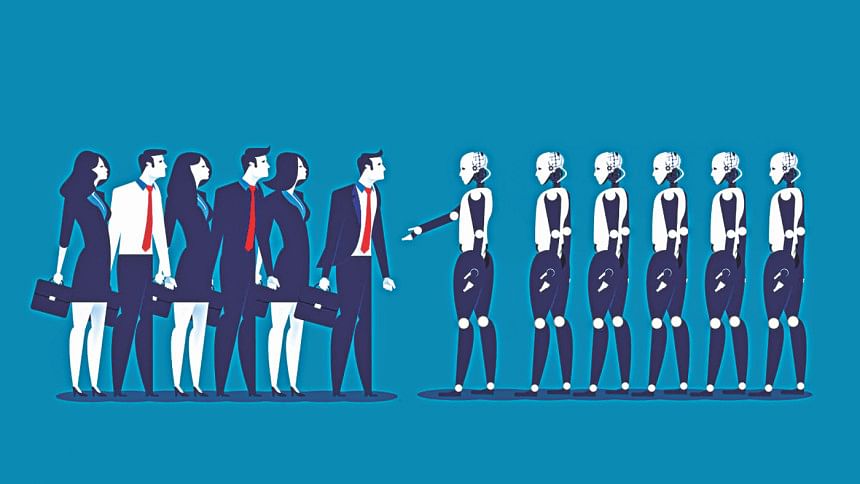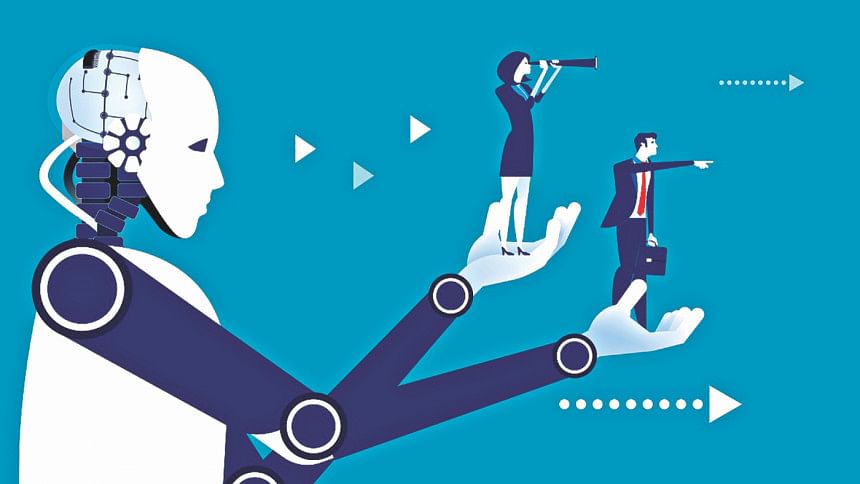Digital revolution: Prospects and preparations

The digital revolution is shaping ways and means of people and planet by blurring fence lines amongst physical, digital, and biological worlds. This fourth industrial revolution or Industry 4.0 is characterised by fusion technologies in artificial intelligence (AI), robotics, internet of things (IoT), virtual reality (VR), 3D printing, genetic engineering, quantum computing, and other technologies. The unprecedented scale and associated complexities of digital systems also test capabilities of governments in their commitment to "leave no one behind" of the Sustainable Development Goals (SDGs), particularly concerning sustainable growth, reduced inequalities, decent work and responsible consumption and production.
The First Industrial Revolution of 17th century changed the traditional production system with the invention of steam engine. The Second Industrial Revolution was driven by new sources of power such as electricity, oil and gas in the beginning of 19th century. The Third Industrial Revolution in the post-second world era heralded computer technology, semi-conductor and microchips, and other electronic and electrical devices, besides newer sources of energy like nuclear power. The penultimate one brought huge changes through likes of internet, mobile communication technology, etc. as well as massive progress in medical technologies, biotechnologies, pharmaceutical industry etc. Nevertheless, the changes and effects of Industry 4.0 on peoples' lives are in no match to the three revolutions.
Work and market
The digital transformation is espoused as an "open access opportunity for all." This forceful tagline suggests digital revolution's supposed intrinsic promises of creating more job opportunities and reduction in hours of work. Such a milieu pronounces less work as an expression of freedom and self-fulfilment. The World Economic Forum (WEF), however, states that about 800 million people could lose their jobs worldwide by 2030. In Bangladesh, approximately 5.7 million unskilled labourers are projected to be redundant at home and abroad due to requirements of technological skills. This is further vexed by historic tracking of developing countries moving away from manufacturing into services at a faster pace than those observed in cases of developed counterparts. This process of premature "de-sindustrialisation" is evinced by indicators such as lesser share of employment of manufacturing along with its value addition to economy compared to those of service sectors. There is a long-held consensus that manufacturing is the primary channel of modernisation and creation of employment, especially by absorbing unskilled labourers. The stories of development in pre-and-post Second World War bear testimonies in this regard as underemployed from agriculture are pulled into manufacturing, thereby increasing consumption spending and resulting into growing national income.
Digital revolution has not emerged from a vacuum. Ceaseless amalgamation of human knowledge and skills, funded primarily by tax payers, reached this level. Yet, publicly-funded innovations are constantly being usurped by a few tech giants, instead of those remaining as public or common goods. Secondly, these behemoths are profiting out of a rather radically changed workplace where producers are also transformed into consumers. The oligarchies are getting their work done by a few numbers of remunerated employees compared to traditional companies while bulk of production is created voluntarily by unpaid users who are too reduced as their consumers, amassing huge amount of surplus by two distinctive ways, besides much of innovations being subsidised by public exchequer. One is seized as economic rent from volunteer producers while the other is generated out of sales of goods and services to them. The economic rent is generated from unpaid labourers, a factor of production, for which costs needed to bring them into production, are not paid. Thirdly, the digital markets are conceptualised as institutions to provide consumers with material well-being. Yet mounting academic research demonstrates evidences of consumers being systematically exploited through illusion, manipulation and deception due to asymmetric information, psychological weaknesses and unequal power. Digital markets, rather than being benign, allegedly intrinsically "phish" consumers as "phools." Such oligarchic system, if not regulated at every level, run risks of rendering people at large exploited and marginalised, instead of allowing them to enjoy freedom and self-fulfilment.

Employment and skills
The revolution opens up an opportunity for Bangladesh to utilise her huge unemployed youth and can transform from the current jobless growth trajectory to a job-creating economy. The country has the potential to reap benefits of "demographic dividend" as one in three people is aged less than 24 years. But the rates of youth unemployment and underemployment are 10.9 percent and 18.7 percent respectively in the country. Moreover, there is an alarming miss-match between creation of employment and new entrants to the labour market. About one million are absorbed in organised and formal sectors out of two million new entrants of the labour market each year since labour force are growing at a rate of 2.2 percent per annum, leaving another million jobless.
E-readiness, comprising e-skills and e-literacy, is a fundamental requirement for a digital society. Unfortunately, out of 58.5 percent economically active population of the country's total population, a mere 5.3 percent have attained tertiary education. The Information and Communication Technology (ICT) industry employs only 0.3 percent of the country's total labour force. This paints a sordid state of demand and supply in quality and quantity while also points out an opportunity for further employment in the sector.
Strategic skills are needed to understand the pros and cons of digital revolution. Furthermore, matching education, training and awareness raising are crucial to make the best out of this transformation. There is talent and potential, but such call for harnessing in quality education and training institutions to match requirements. Skills alone cannot be developed by individuals; rather comes from education systems and on-the-job trainings. The cycle has to start from primary education, strengthen in secondary and vocational spheres and further in tertiary level. A significant rise in public expenditure is required for enhancing capabilities, and that too have to be supplemented by the industry. Bangladesh will not be able to march forward, if she remains a mere recipient of digital services, pioneered by other countries.
Enterprises and infrastructure
There is an elating hope that IT export would surpass the ready-made garment sector, transiting from the current domination of a single-export to a diversified economy. This means 40 times increase in the sectoral export, which is currently valued at one billion US dollars. The industry has exhibited higher growth curve in recent years, indicating enormous latent possibilities, though the current size is notably tinier than other offshoring titans. Most of the country's IT firms are small-sized and a few international conglomerates operate on a limited scale. The start-ups may show resilience, if infrastructure and incentives could be provided in addition to supply of quality skills.
Infrastructures have emerged as big challenge in developing countries like Bangladesh to realise potentials of digital revolution. Introduction of new technologies such as analytics, development of networks and smart devices face impediments due to poor ICT infrastructure. For example, broadband penetration is still low in Bangladesh like other developing countries compared to developed economies. The estimation of Bangladesh Telecommunication Regulatory Commission suggests that internet penetration is just above 50 percent of total mobile users in Bangladesh.
E-Commerce Association of Bangladesh reports 1,000 e-Commerce sites and active 8,000 e-Commerce Facebook pages in the country. Besides, commercial banks and financial institutions are adopting online transactions. In addition, mobile financial services enabled easy and quick transactions of money. Against 40 million bank accounts, only 8.3 million debit cards were issued across the country. Customers under online banking system are only 1.5 million.

Regulation and revenue
There is much adulation about big data. Big data is a non-rival public good. Yet there are examples of such being monopolised. In the new wave of changes due to digital transformation, new problems regarding public good management are emerging. In this regard, government provisions are needed to have citizens' command over data and make a dent to release from grips of monopolies. Bangladesh needs to revisit her policies adopted in the lines of liberalisation and deregulation and to undertake rigorous research to formulate policies to face the digital challenges.
Blockchain is often described as decentralised, distributed, and often times public technology and huge potentials are attributed as a means to development. Nevertheless, in an absence of regulatory oversights, there are volatilities due to scams and market manipulations in cryptocurrencies and such penalise investors like Ponzi schemes. Blockchain are touted to do away with intermediaries, but in some occasions traditional means such as banks provide services apparently at low cost to the end user. Blockchain requires large amounts of computing power to run complex algorithms, necessitating enormous amount of energy. This costs heavily on environment, particularly in the backdrop of climate crisis, causing higher vulnerabilities to countries such as Bangladesh. This calls for transformation of the system to a low intense energy user.
Moreover, the tech oligarchies remain out of reach of taxation. For example, these are operating in Bangladesh and earning billions of revenues, but are non-resident for the purposes of taxation. Some tech giants are also reluctant to have country offices in smaller countries, with much interest in having the company registered in tax heavens. Several countries, like Spain, France, and India have introduced "digital tax" and taxation on these companies could be a significant source of revenue for the government.
Consent and dissent
The fourth industrial era has opened new platforms for citizens to engage with governments, express their opinions, organise their efforts, and even circumvent supervision of public authorities. At the same time, governments can use digital means to control citizens and manufacture consents. Nevertheless, regulatory role of governments depends on the nature of a state.
Government can regulate misuse of digital platforms using policies, means and instruments. Yet controlling provisions of governments may also go against fundamental rights of citizens. For example, "Digital Security Act" in Bangladesh has been, decried by human rights defenders as a means to silence dissent. Hence, regulatory policies should be made adhering to civil and political rights so that authoritarian states may not be able to turn those as weapons of reigning in atmospheres of fear and domination. There should be a balance of government's efforts to reach people through promotion of their services and people's opportunity to express their opinions. If justice cannot be ensured, coercion would prevail.
Norms and values
Technology is shaping existing social order. It is making a new wave of fusions among societies and cultures. Established norms are reshaping and preferences derived from those norms within societies can also be mobilised through technology. Different views, ideas, concepts, doctrines can be created, disseminated and reinforced easily than before. Social media has enabled people from different unknown backgrounds to gather in a common platform to present their perspectives. In this way ICT is tremendously influencing politics and democratic norms. Social networking sites are being used by populist leaders, emotionally engaging within a same tribe, isolating them from other narratives. In this way, politicians are manufacturing consent in favour of their ideological projects.
Social media is also making people altruistic. For example, an open platform like Wikipedia demonstrates that people often have altruistic motives, though mainstream views that individuals are guided by virtues of self-interest and do not care about outcomes of others. Such projects reveal human beings' two intrinsic qualities: reciprocity and inequality aversion. Reciprocity is people's willingness to reward friendly actions and punish detrimental actions while inequality aversion implies people's tendency to reduce inequality by taking costly actions with altruistic preferences.
Digital platform is, therefore, opening new windows for many as well as increasing inequalities. It is connecting people from many parts of the world as well as creating a "connected isolation". People are virtually connected but remain isolated even within a family. Technological development has become a new means of generating, disseminating and reinforcing different views and ideologies, which are often challenging established order. In facing challenges of the changing order there is a need to place regulatory provisions that represent cultures and traditions of Bangladesh as well as encompass universal values and obligations.

Security and privacy
As technological advancement is occurring rapidly, there is a widespread concern regarding legal and social protection. New technologies like artificial intelligence, drone system which have created a huge hype and added substantial values, amongst others, in the areas of human rights, economic outcomes and basic service deliveries. On the contrary, there are strong allegations that these technologies are being used, violating human rights, civic freedoms and sovereignty. The persisting contrast of the same technologies has become a major concern. For example, there are cyber wars often among countries. Artificial intelligence and drones are being used as lethal weapons. Advocacy groups, trade unions, child-rights organisations and other institutions are also facing digital threats and attacks. In some cases, ordinary citizens are killed and sovereignty of countries is put at risk. There are fears of robotic war in future if this negative aspect of technological advancement cannot be reined in. Most importantly, it has to be realised that technological transformation should be used as a blessing for general public, not as a weapon for mass destruction.
In this current flow of movement towards digital transformation, security and privacy are two pivotal issues that too have become notable concerns. This creates a mounting challenge in countries with authoritarian regimes and fragile institutions. In order to integrate the whole, multilateral enforceable security and privacy regulatory mechanisms should be developed. Innovative and resilient privacy and security system will lead towards faster and more flexible collaborative value networks and smart production provisions. More challenges are yet to come hand in hand with increased use of data analytics. "Trust" is a significant issue and also an imperative in this new era.
Conclusions: Ecosystem and sustainability
The current digital revolution is supposed to affect the whole ecosystem. The relations amongst human being, technology, nature and society may lead to massive transformation. All stakeholders within the system must have their just share such that no one gets alienated or exploited from the cycle.
There were more than 26 billion connected devices in 2019, which may increase to 75 billion by 2025. Estimations indicate that the current digital transformation consumes about seven percent of the world's electricity, which is to leap up to 12 percent by 2020. Digitalisation has, therefore, emerged as potential challenge to sustainability of ecosystems pertaining to social and environmental wellbeing. The ecosystem sustainability depends on the provisions that guarantee just and equitable share and access to digital platforms irrespective of class, caste or creed as well as on the terms of access and benefit sharing between humans and nature. Technological advancement, much like nature, will, hopefully, find its way.
Dr Rashed Al Mahmud Titumir is Professor of Economics at the Department of Development Studies at the University of Dhaka and Chairperson of the Dhaka based think-tank, Unnayan Onneshan.

 For all latest news, follow The Daily Star's Google News channel.
For all latest news, follow The Daily Star's Google News channel. 



Comments